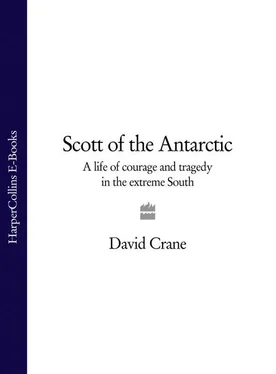It was, after all, little more than a decade since a cabinet that boasted a marquess for Prime Minister, another at the War Office, a duke for Lord President, the son of a duke as Secretary of India, an earl, a viscount, three barons and a brace of baronets, seemed to hold out to Englishmen a promise of social and historic permanence. In the United States – the power of the future – and France – the historic enemy of the past – politics and social status had long parted company, but faced with a government that seemed to reconcile privilege and responsibility, heredity and power as effortlessly as Salisbury’s did, it is hard not to succumb to the illusion.
Yet if images of the King presiding at Cowes, of Balfour golfing at North Berwick, or Sir Edward Grey fly-fishing on the Itchen, seem to extend the shelf-life of the ‘Splendid’ in Splendid Isolation long beyond its doctrinal usefulness, it certainly did not seem a Golden Age at the time. The Poet Laureate, Alfred Austin’s, idea of heaven might be to sit in an English garden and receive telegrams alternately announcing British victories by land and sea, but after the humiliations of the Boer War at the hands of a nation no bigger than ‘Flintshire and Denbighshire combined’, it was not just Kipling who could see the writing on the walls of Tyre.
There are certain moments in modern British history that have a psychological impact out of all proportion to their practical consequences, and the war in South Africa is one of these. In the past even such defeats as Majuba Hill could be transmuted into allegories of British heroism, but as Europe howled in moral outrage at British concentration camps, and British troops came invalided home in their thousands, the jubilant vision of Herbert Bismarck, the anglophobe son of the ‘Iron Chancellor’, of a country ‘smothered in its own fat’ seemed something more than Prussian wishful thinking.
It was as if Britain, as it began the long retreat from empire and abandoned its historic isolation for the entanglements of European alliances, had collectively glimpsed the possibility that the whole fabric of its power was nothing but a show. From the moment that naval architects had created the Dreadnought the navy that had reigned supreme at the Queen’s Jubilee was so much scrap. But what if the whole edifice of power was a charade? What if the obsessions with espionage and invasion in the popular fiction of the day were justified? What if the paranoid hatred of decadence and homosexuality and ‘foreign influence’ was no more than a last, dying protest of a stricken empire? What if the very texture of national life, the physical and imaginative landscape of its identity, its historical sense of self, were all equally flawed? What if ‘The great house, the church, the village, and the labourers and their servants in their stations and degrees,’ as Wells wrote, had ‘even now passed away’? ‘The great houses stand in the parks still, the cottages cluster respectfully on their borders, touching their eaves with their creepers, the English country-side … persists obstinately in looking what it was. It is like an early day in a fine October. The hand of change rests on it all, unfelt, unseen; resting for a while, as it were half reluctantly, before it grips and ends the thing forever. One frost and the whole face of things will be bare, links snap, patience end, our fine foliage of pretences lie glowing in the mire … ’
In such a climate of doubt and self-questioning, the outpouring of national pride over Scott was no demonstration of imperialist triumphalism but its reverse, its militancy the militancy of weakness, its stridency the stridency of a country desperate for assurance that the moral qualities that once made it great were still intact. ‘Children,’ Arthur Machen – the great mythologiser of ‘The Angel of Mons’ – began the story read to hundreds of thousands of schoolchildren across the country as Scott’s memorial service at St Paul’s opened, ‘you are about to hear the true story of five of the bravest and best men who have ever lived on the earth since the world began. You are English boys and girls, and you must often have heard England spoken of as the greatest country in the world, or perhaps you have been told that the British Empire … is the greatest Empire that the world has ever seen … when we say that England is great we are not thinking of the size of the country or of the number of people who live in it. We are thinking of much more important things, and if you listen to the story that is to be read to you, you will find out what greatness really does mean.’
‘Oh! England! oh! England! What men have done for thee,’ responded one eleven-year-old girl, Mary Steel, and her sob of relieved gratitude found an echo across the country. ‘Amundsen says he won the Cup,’ began one extraordinary poem sent to Scott’s bereaved family by an E. Clacy – a poem that in its grotesque fusion of sporting and religious symbolism brings into single focus every outdated fantasy of Arthurian chivalry and gamesplaying, dog-loving, xenophobic English pre-eminence that ever floated an empire.
Amundsen says he won the Cup
Then why do our men guard it?
Two lie prone, but one sits up
Over his hands there hovers a Cup
Amundsen says he won that Cup
Then why does our man hold it?
‘Devil’s Ballroom’ and ‘Devil’s Ravine’
Naming the vastnesses! What does he mean?
‘Shambles’, the dogs explain that name
Where they lie butchered – exhausted and lame
With bringing him up! …
Over the tent and into the tent
Floats the wonderful Cup
Hovers and touches those that lie prone
And then to the Master – who sits alone
Fire – Blood – or Wine?
He sees right into the Thing Divine
For he sits up
Into his hands – the Holy Grail
Into his body – cease of pain
Into his heart – a voice says ‘Hail’
And he knows he has won that Cup.
Amundsen says he won the Cup
Then why does our man hold it?
If ever a man needed saving from the enthusiasm of his admirers, in fact, it was Scott. During the course of his life the impassioned support of Sir Clements Markham would invariably be as much a liability as a help, and in death the jingoistic and imperialist uses to which his name and story were pressed guaranteed that when the reaction came it would be bitter and violent. ‘I found an essentially little man,’ Trevor Griffiths, the dramatist and influential populariser of the hostile modern ‘Scott myth’, wrote in 1985, ‘of deeply ordinary talent: light, conventional, fearful, uncertain, manipulative, ill-tempered, irrational, secretive, driven, at times touching in his misery, trapped inside a particular class-specific Englishness, unequipped, uncharismatic.’
Were the sentiments expressed in E. Clacy’s poem the only ones heard at Scott’s death, the backlash that has seen his reputation plummet over the last years might be understandable; but his tragedy touched the popular imagination in ways that had nothing to do with imperial destiny, ‘class-specifics’ or ‘Englishness’. The race for the Poles in the Heroic Age of Exploration had certainly excited intense national rivalries, but as the telegrams, donations and letters of condolence poured in from Toronto and Lyttelton, and from Tempico and Christiania, all that was forgotten in a sympathy that predicates a shared – and almost proprietorial – pride in his end.
This picture of universal sorrow is not the whole story, of course – even in these first days the doubts and questions were there – but when Dean Inge declared Scott’s triumph over the grave, it was not just an expression of Christian hope but an absolute conviction that Death had no sting to wound a man who had lived and died as Scott. When he was interviewed in New York, Shackleton might publicly wonder how Scott’s party could have succumbed to a mere blizzard, but not in even his most sanguine moments could he have seen what would happen, or anticipate his own posthumous metamorphosis from Edwardian freebooter into middle-management guru while the beau ideal of English chivalry became a byword for bungling incompetence.
Читать дальше












![John Bruce - The Lettsomian Lectures on Diseases and Disorders of the Heart and Arteries in Middle and Advanced Life [1900-1901]](/books/749387/john-bruce-the-lettsomian-lectures-on-diseases-and-disorders-of-the-heart-and-arteries-in-middle-and-advanced-life-1900-1901-thumb.webp)